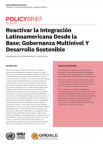The United States is one of the United Nations’ most important stakeholders. The UN was created at the initiative of the US after World War II. Washington provides the largest financial contribution to the UN’s overall budget. The US hosts the UN’s headquarters in New York. The UN Security Council sits at the apex of a 75-year old Rules Based International Order (RBIO) heavily devised, underwritten and anchored by the United States.
Consecutive US administrations up to 2016 broadly supported the post-1945 multilateral architecture and RBIO, which they saw as advancing US power and geostrategic interests.1 The Trump Administration has broken away from this previous Beltway consensus. Since 2017, US foreign policy has become more transactional, mercantile, nationalist, and unpredictable, with a greater emphasis on sovereignty and a reduced focus on alliances. The Trump Administration, unlike its predecessors, has often seen the RBIO as constraining, rather than advancing, US national interests. It holds a global outlook that is more Hobbesian: a power-based international system with competition between states. The President has described this approach to the UN General Assembly as ‘Principled Realism’.
An important question for other UN Member States is whether this shift in US global outlook under the Trump Administration marks a four year aberration from – or the new normal for – US foreign policy. The outcome of the 2020 Presidential election will be fundamental in determining this. However, US foreign and multilateral policy is also changing in response to longer-term domestic and geopolitical shifts. Internationally, the rise of new Great Powers and new global threats (such as climate change and artificial intelligence) have placed stresses on the post-1945 international system.3 Domestically, there is growing weariness amongst much of the US public regarding the global role of the US, and a feeling that the current international system does not always deliver for US interests. The Trump Administration has accelerated, but did not create, this dynamic.
Against this backdrop, this paper address three issues. First, the paper considers US policy and diplomacy towards the UN, particularly in New York, over the first three years of the Trump Administration. Second, the paper sets out how US policy and diplomacy towards the UN could develop under two post-2020 scenarios: (i) a second Trump Administration, or (ii) a new Democratic administration. Third, the paper provides suggestions for how both the UN Secretariat and UN Member States who see an effective UN – and a US commitment to multilateralism – as being in their national interests might respond to either post-2020 scenario in terms of their engagement with the US, and their wider diplomacy, in New York.
Download the report here.


